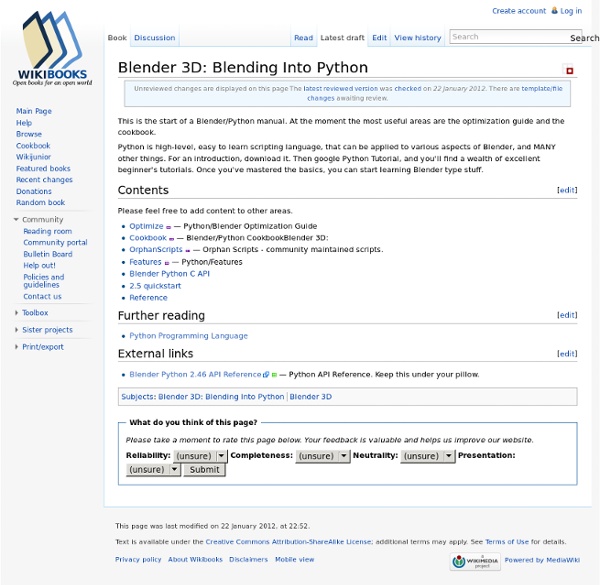Blender 3D: Blending Into Python - Wikibooks, collection of open-content textbooks
This is the start of a Blender/Python manual. At the moment the most useful areas are the optimization guide and the cookbook. Python is high-level, easy to learn scripting language, that can be applied to various aspects of Blender, and MANY other things. For an introduction, download it. Then google Python Tutorial, and you'll find a wealth of excellent beginner's tutorials. Contents[edit] Please feel free to add content to other areas. Optimize — Python/Blender Optimization GuideCookbook — Blender/Python CookbookBlender 3D:OrphanScripts — Orphan Scripts - community maintained scripts.Features — Python/FeaturesBlender Python C API2.5 quickstartReference Further reading[edit] Python Programming Language External links[edit] Blender Python 2.46 API Reference — Python API Reference.
BeginnersGuide - PythonInfo Wiki
New to programming? Python is free and easy to learn if you know where to start! This guide will help you to get started quickly. Chinese Translation/中文版入门 New to Python? Read BeginnersGuide/Overview for a short explanation of what Python is. Getting Python Next, install the Python 3 interpreter on your computer. There are also Python interpreter and IDE bundles available, such as Thonny. At some stage, you'll want to edit and save your program code. Learning Python Next, read a tutorial and try some simple experiments with your new Python interpreter. If you have never programmed before, see BeginnersGuide/NonProgrammers for a list of suitable tutorials. Most tutorials assume that you know how to run a program on your computer. Some sites offer in-browser coding for those who want to learn Python: Print a cheat sheet of the most important Python features and post it to your office wall until you know the basics well. Need Help? Need help with any of this? Complete list of Beginner's Guide pages
s Python Class - Educational Materials
Welcome to Google's Python Class -- this is a free class for people with a little bit of programming experience who want to learn Python. The class includes written materials, lecture videos, and lots of code exercises to practice Python coding. These materials are used within Google to introduce Python to people who have just a little programming experience. The first exercises work on basic Python concepts like strings and lists, building up to the later exercises which are full programs dealing with text files, processes, and http connections. The class is geared for people who have a little bit of programming experience in some language, enough to know what a "variable" or "if statement" is. To get started, the Python sections are linked at the left -- Python Set Up to get Python installed on your machine, Python Introduction for an introduction to the language, and then Python Strings starts the coding material, leading to the first exercise.
Python Ecosystem - An Introduction » mirnazim.org
When developers shift from PHP, Ruby or any other platform to Python, the very first road block they face (most often) is a lack of an overall understanding of the Python ecosystem. Developers often yearn for a tutorial or resource that explains how to accomplish most tasks in a more or less standard way. What follows is an extract from the internal wiki at my workplace, which documents the basics of the Python ecosystem for web application development for our interns, trainees and experienced developers who shift to Python from other platforms. This is not a complete resource. My target is to make it a work in perpetual progress. Hopefully, over time, this will develop into an exhaustive tutorial. Intended Audience This is not about teaching Python - the programming language. I am assuming you are working on Linux (preferably Ubuntu/Debian) or a Linux-like operating system. Search the web for the best possible ways of installing Python on your operating system. The version confusion
Learn Python - Free Interactive Python Tutorial
7 Major Players In Free Online Education
By Jennifer Berry Imagine a world where free, college-level education was available to almost everyone. Believe it or not, you're living in that world right now. Online education has been around for decades, but in the past couple of years, interest has spiked for massive open online courses, otherwise known as MOOCs, according to Brian Whitmer, co-founder of Instructure, an education technology company that created the Canvas Network, a platform for open online courses. "Since 2012, MOOCs have caught the attention of the educational world due to their potential to disrupt how education is delivered and open up access to anyone with an Internet connection," Whitmer explains. Related: 7 Degrees You Can Earn While Keeping Your Job If this seems too good to be true, you should know that, like many endeavors, students will largely get out of these classes what they put into them. Read on to learn more about seven of the most popular MOOCs and some of the great free classes they offer. Coursera
Related:
Related:



